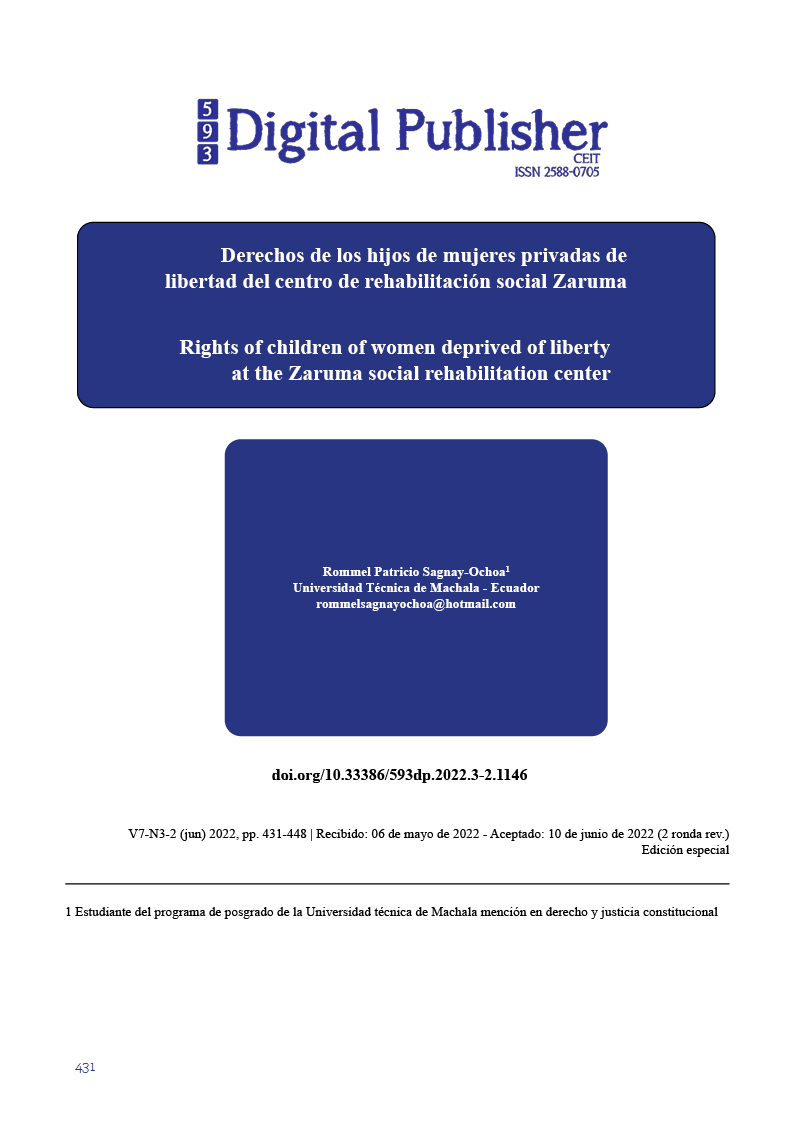Rights of children of women deprived of liberty at the Zaruma social rehabilitation center
Main Article Content
Abstract
This article exposes the importance of the fundamental rights of children who live with their mothers in the Zaruma social rehabilitation center, a study applicable to the year 2020, since children are part of the prison population in Ecuador whose mothers are serving a sentence. deprivation of liberty, through a review from a point of view of the relevant regulations as rights recognized in the Ecuadorian Constitution, other applicable legislation, to establish the violation or not of these rights, compared to the reality in which they are found within the center of deprivation of liberty, and how it affects the cognitive, affective, emotional development of minors.
Recognizing the problem of the prison crisis in Ecuador, the lack of allocation of resources, violent acts in prisons, lack of prison personnel; It is important to ask the following question:
In what state are the children who live with their mothers deprived of liberty in relation to constitutional guarantees? This question is formulated in order to find a possible recommendation through bills, public policy projects, if it is the case to find that there is a violation of the rights of minors.
The research method to be used is the Deductive through Documentary Research, Analytical Method and the interview as a tool.
Downloads
Article Details

This work is licensed under a Creative Commons Attribution-NonCommercial-ShareAlike 4.0 International License.
1. Derechos de autor
Las obras que se publican en 593 Digital Publisher CEIT están sujetas a los siguientes términos:
1.1. 593 Digital Publisher CEIT, conserva los derechos patrimoniales (copyright) de las obras publicadas, favorece y permite la reutilización de las mismas bajo la licencia Licencia Creative Commons 4.0 de Reconocimiento-NoComercial-CompartirIgual 4.0, por lo cual se pueden copiar, usar, difundir, transmitir y exponer públicamente, siempre que:
1.1.a. Se cite la autoría y fuente original de su publicación (revista, editorial, URL).
1.1.b. No se usen para fines comerciales u onerosos.
1.1.c. Se mencione la existencia y especificaciones de esta licencia de uso.
References
Asamblea Constituyente. (20 de octubre de 2008). Constitución de la República del Ecuador. Constitución de la República del Ecuador, 449. Quito, Pichincha, Ecuador: Registro oficial. Obtenido de oas.org/juridico/pdfs/mesicic4_ecu_const.pdf
Baca Arias, R. y. (27 de 11 de 2018). Reglas de Bangkok, aplicadas a las mujeres privadas de la libertad, por. 27. Barranquilla, Colombia. Obtenido de https://bonga.unisimon.edu.co/bitstream/handle/20.500.12442/2368/Reglas%20de%20Bangkok%2c%20aplicadas%20a%20las%20mujeres%20privadas%20de%20la%20libertad%2c%20por%20narcotr%c3%a1fico%20en%20Colombia%20entre%20los%20a%c3%b1os%202013%20y%202018.pdf?sequence
Comisión Interamericana de Derechos Humanos. (2022). Personas Privadas de Libertad en Ecuador. Comisión Interamericana de Derechos Humanos. Washington: Organización de Estados Americanos. Obtenido de https://www.oas.org/es/cidh/informes/pdfs/Informe-PPL-Ecuador_VF.pdf
Congreso Nacional. (03 de julio de 2003). Código de la niñez y adolescencia. Código de la niñez y adolescencia, 737. Quito, Pichincha, Ecuador: Registro Oficial. Obtenido de https://www.registrocivil.gob.ec/wp-content/uploads/downloads/2014/01/este-es-06-C%C3%93DIGO-DE-LA-NI%C3%91EZ-Y-ADOLESCENCIA-Leyes-conexas.pdf
Drogas & género. (2017). Mujeres Políticas de Drogas y encarcelamiento. Drogas & género. Barcelona: Drogas & género. Obtenido de https://www.drogasgenero.info/wp-content/uploads/WomenDrugsIncarceration-ES.pdf
Espinoza, O. (2016). MUJERES PRIVADAS DE LIBERTAD: ¿es posible su reinserción social? Salvador, Brasil: Caderno CRH. Obtenido de http://www.redalyc.org/articulo.oa?id=347646780007
EUROsociAL. (2015). GRUPOS VULNERABLES Informe sobre el abordaje de la vulnerabilidad en EUROsociAL. Madrid. Obtenido de http://sia.eurosocial-ii.eu/files/docs/1447416430-informe_grupos%20vulnerables.pdf
Fausto Yepez CNN en español. (17 de 03 de 2022). Cárceles de Ecuador, sin control efectivo por parte del Estado, según informe de la CIDH. CNN en Español. Obtenido de https://cnnespanol.cnn.com/2022/03/17/carceles-ecuador-sin-control-efectivo-del-estado-informe-cidh-orix/
Fernandez, J. (20 de octubre de 2017). Las reglas de Bangkok: perspectiva de género en el tratamiento de personas privadas de libertad. Obtenido de Amnistia Internacional: https://www.amnistia.org/ve/blog/2017/10/3860/reglas-de-bangkok-perspectiva-de-genero-en-tratamiento-de-privadas-de-libertad
Inciarte, A. (2010). Consecuencias psicosociales en niños cuyas madres se encuentran cumpliendo pena privativa de libertad. En A. Inciarte, Consecuencias psicosociales en niños cuyas madres se encuentran cumpliendo pena privativa de libertad. (Vol. 16, pág. 13). Maracaibo, Venezuela: Revista de Ciencias Sociales (Ve). Obtenido de http://www.redalyc.org/articulo.oa?id=28016297014
Ministerio de Trabajo de Ecuador, I. (2016). Dirección de Atención a Grupos Prioritarios: Rendición de cuentas 2016. Ministerio de Trabajo en Ecuador, , Dirección de Atención a Grupos Prioritarios. Quito: Ministerio de Trabajo en Ecuador,. Obtenido de https://www.trabajo.gob.ec/wp-content/uploads/2017/05/GRUPOS-PRIORITARIOS.pdf
Nuñez, J. (enero de 2006). La crisis del sistema penitenciario en Ecuador. Flacso sede Ecuador, 6. Obtenido de https://repositorio.flacsoandes.edu.ec/xmlui/bitstream/handle/10469/2356/04.+La+crisis+del+sistema+penitenciario+en+el+Ecuador.+Jorge+Nu%F1ez.pdf;jsessionid=ADA58FF50EC13C8714601E19F9342FA7?sequence=1
Organización Naciones Unidas. (16 de marzo de 2011). Reglas de las Naciones Unidas para el tratamiento de las reclusas y medidas no privativas de la libertad para las mujeres delincuentes y sus comentarios. Bangkok, Bangkok, Tailandia: Naciones Unidas. Obtenido de https://www.unodc.org/documents/justice-and-prison-reform/Bangkok_Rules_ESP_24032015.pdf
Servicio Nacional De Atención Integral A Personas Adultas Privadas De La Libertad Y Adolescentes Infractores. (30 de julio de 2020). Reglamento Del Sistema Nacional De Rehabilitación Social. Reglamento Del Sistema Nacional De Rehabilitación Social, 86. Quito, Pichincha, Ecuador: Registro Oficial 958. Obtenido de https://www.atencionintegral.gob.ec/wp-content/uploads/2020/08/Reglamento-del-SIstema-de-Rehabilitacio%CC%81n-Social-SNAI-2020_compressed.pdf


